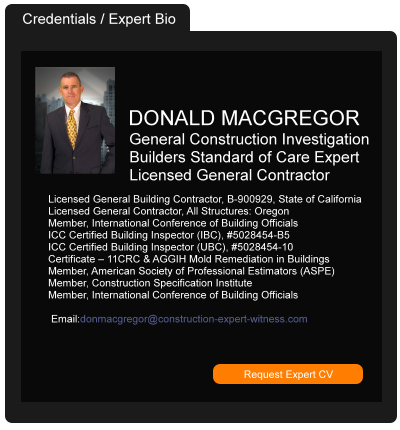Las Vegas HOA Conspiracy & Fraud Case Delayed Again
September 17, 2014 —
Beverley BevenFlorez-CDJ STAFFAccording to the Las Vegas Review-Journal, “[T]he federal trial of former construction company boss Leon Benzer and five others in a massive scheme to take over Las Vegas-area homeowners associations” has been delayed to February 2015 by U.S. District Judge James Mahan.
Defense attorneys “argued they needed more time to review thousands of pages of new documents provided by prosecutors.” The prosecutors did not object to the delay.
Benzer and the other defendants face conspiracy and fraud charges in an HOA takeover scheme that allegedly occurred between 2003 and 2009.
Read the court decisionRead the full story...Reprinted courtesy of
California Imposes New Disabled Access Obligations on Commercial Property Owners
October 07, 2016 —
Garret Murai – California Construction Law BlogThe following article was written by my colleague
David Goldman on the new ADA accessibility legislation which was signed into law this past month by Governor Brown.
Since July 1, 2013, California Civil Code section 1938 has required commercial property owners to disclose in every commercial lease whether the property being leased has been inspected by a Certified Access Specialist (“CASp”). A CASp is an individual certified by the State of California as qualified and knowledgeable of construction-related access to public accommodations by persons with disabilities. In addition to disclosing whether or not the property being leased has been CASp inspected, if a CASp inspection has occurred, the commercial lessor must disclose in the lease whether the premises has or has not met all the applicable construction-related accessibility standards established by law. These lease requirements, along with other disability access obligations, were discussed in an
earlier article written in 2012.
Read the court decisionRead the full story...Reprinted courtesy of
Garret Murai, Wendel, Rosen, Black & Dean LLPMr. Murai may be contacted at
gmurai@wendel.com
Statute of Limitations Upheld in Construction Defect Case
September 30, 2011 —
CDJ STAFFThe Missouri Court of Appeals has ruled in Ball v. Friese Construction Co., finding that Mr. Ball’s claims were barred by the statute of limitations.
Mr. Ball hired Friese Construction Company to build a single-family home. The sale was completed on March 29, 2001. That December, Mr. Ball complained of cracks in the basement floor. SCI Engineering, n engineering firm, hired by Friese, determined that the home’s footing had settled and recommended that Mr. Ball hire a structural engineer to determine if the footings were properly designed and sized. In September 2002, the structural engineer, Strain Engineering, determined that the cracks were due to slab movement, caused in part by water beneath the slab, recommending measures to move water away from the foundation. In 2005, Mr. Ball sent Friese correspondence “detailing issues he was having with the home, including problems with the basement slab, chimney structure, drywall tape, and doors.” All of these were attributed to the foundation problems. In 2006, Friese stated that the slab movement was due to Ball’s failure to maintain the storm water drains.
In 2009, Ball received a report from GeoTest “stating the house was resting on highly plastic clay soils.” He sued Friese in May, 2010. Friese was granted a summary judgment dismissing the suit, as the Missouri has a five-year statute of limitations. Ball appealed on the grounds that the extent of the damage could not be determined until after the third expert report. The appeals court rejected this claim, noting that a reasonable person would have concluded that after the conclusion of SCI and Strain Engineering that “injury and substantial damages may have occurred.”
The court concluded that as there were not “continuing wrongs causing new and distinct damages,” he should have filed his lawsuit after the first two expert reports, not waiting seven years for a third expert to opine.
Read the court’s decision…
Read the court decisionRead the full story...Reprinted courtesy of
President Trump Nullifies “Volks Rule” Regarding Occupational Safety and Health Administration (OSHA) Recordkeeping Requirements
April 13, 2017 —
Louis “Dutch” Schotemeyer – Newmeyer & Dillion LLPOSHA requires employers to maintain safety records for a period of five years. The Occupational Safety and Health Act contains a six month statute of limitations for OSHA to issue citations to employers for violations. In an effort to close the gap between the five years employers are required to keep records and the six month citation window, the Obama Administration implemented the “Volks Rule,” making recordkeeping requirements a “continuing obligation” for employers and effectively extending the statute of limitations for violations of recordkeeping requirements from six months to five years.
On March 22, 2017, the Senate approved a House Joint Resolution (H.J. Res. 83) nullifying the “Volks Rule” and limiting the statute of limitations to six months for recordkeeping violations. President Trump signed the resolution nullifying the “Volks Rule” on April 3, 2017. The nullification appears to be in line with President Trump’s stated goal of generally eliminating governmental regulations.
What Does This Mean for California Employers?
California manages its own OSHA program, which generally follows the federal program, but is not always in lock-step with Federal OSHA. Cal/OSHA, under its current rules, may only cite employers for recordkeeping violations that occurred during the six months preceding an inspection or review of those records. To date, there has been no indication that California’s Division of Occupational Safety and Health (DOSH) has plans to adopt the “Volks Rule.” Barring a change, California employers will continue to operate under the status quo and be required to maintain safety records for five years, but will only be exposed to citations for recordkeeping violations occurring within the last six months.
Current Cal/OSHA Recordkeeping Requirements
Cal/OSHA form 300 (also known as the “OSHA Log 300”) is used to record information about every work-related death and most work-related injuries that cannot be treated with onsite first aid (specific requirements can be found in the California Code of Regulations, Title 8, Sections 14300 through 14300.48). Currently, California Code of Regulations, Title 8, Section 14300.33 requires employers to retain OSHA Log 300 for a period of five years following the end of the calendar year during which the record was created, despite the fact that Cal/OSHA can only cite employers for failing to maintain such records for up to six months preceding an inspection.
Looking to the Future
Cal/OSHA is working on regulations that would require electronic submission of OSHA Log 300 records in California. This would bring Cal/OSHA more in line with Federal OSHA, which already requires electronic submission.
About Newmeyer & Dillion
For more than 30 years, Newmeyer & Dillion has delivered creative and outstanding legal solutions and trial results for a wide array of clients. With over 70 attorneys practicing in all aspects of business, employment, real estate, construction and insurance law, Newmeyer & Dillion delivers legal services tailored to meet each client’s needs. Headquartered in Newport Beach, California, with offices in Walnut Creek, California and Las Vegas, Nevada, Newmeyer & Dillion attorneys are recognized by The Best Lawyers in America©, and Super Lawyers as top tier and some of the best lawyers in California, and have been given Martindale-Hubbell Peer Review's AV Preeminent® highest rating. For additional information, call 949-854-7000 or visit www.ndlf.com.
Read the court decisionRead the full story...Reprinted courtesy of
Louis "Dutch" Schotemeyer, Newmeyer & Dillion LLPMr. Schotemeyer may be contacted at
dutch.schotemeyer@ndlf.com
Arizona Court of Appeals Upholds Judgment on behalf of Homeowners against Del Webb Communities for Homes Riddled with Construction Defects
February 26, 2015 —
Law Offices of Kasdan Weber Turner LLPARIZONA COURT OF APPEALS UPHOLDS LOWER COURT DECISION APPROVING $13,703,039 JUDGMENT ON BEHALF OF 460 SUN CITY GRAND HOMEOWNERS AGAINST DEL WEBB COMMUNITIES, INC., A SUBSIDIARY OF PULTEGROUP, INC., FOR HOMES RIDDLED WITH CONSTRUCTION DEFECTS
--
In a separate case, an Arizona Superior Court awards $10,619,640 to another 279 Sun City Grand homeowners who sued Del Webb over construction defects, which Del Webb has appealed--
PHOENIX, Arizona – The Arizona Court of Appeals, Division One, [on Tuesday] issued a unanimous ruling upholding a lower court decision awarding $13,703,039 to 460 Sun City Grand homeowners who sued developer Del Webb Communities, Inc., a subsidiary of PulteGroup, Inc., for numerous construction defects that severely damaged the plaintiffs’ homes. Sun City Grand is an age-restricted community located in Surprise.
In a separate case, an Arizona Superior Court awarded $10,619,640 to another group of 279 Sun City Grand homeowners for multiple construction defects in their homes.
Stephen Weber, the managing partner in the Phoenix office of Kasdan Weber Turner LLP, which represents the homeowners, said that the case is based on construction defects that damaged the plaintiffs’ homes and took several years to resolve. The defects include defective windows, poorly installed stucco, expansive soil conditions that resulted in cracking of drywall, and deteriorating concrete foundation systems, among other problems.
“Del Webb placed an arbitration clause in the sales contracts and the homeowners honored it. The binding arbitration that includes the owners of 460 homes in Sun City Grand was completed in late 2011 when the arbitration panel unanimously awarded the homeowners $13,703,039. Del Webb then challenged the award in Superior Court and the Superior Court confirmed the award in full,” Weber explained. “Del Webb did not like the Superior Court ruling either and challenged it in the Court of Appeals. And now three justices of the Arizona Court of Appeals have unanimously affirmed the Superior Court order and the arbitration award stands. Now they will have the funds to repair their homes, restore their value, and live in comfort,” Weber said.
The $13,703,309 award includes amounts for home repairs, attorney fees, expert fees, court costs and pre-judgment interest. An additional $1,401,236 in post-judgment interest also accrued while the case was on appeal. The other construction defect case that awarded $10,619,640 to homeowners was not covered by binding arbitration.
Del Webb has also appealed that case which will now go through the appeals process. That could take two to three years and again the homeowners will have to wait for the final judgment, Weber noted.
Ken Kasdan, senior and managing partner of the Kasdan Weber Turner firm and one of the nation’s leading experts on construction defect litigation, said the defects are egregious. “The multiple defects rob them of pride of ownership,” he said. “A home is something that a homeowner wants to be proud of. Unfortunately, defective workmanship and poor construction have caused damage to the homes. Now these homes can be repaired and the homeowners will no longer have to deal with defective windows and cracked slabs. Developers need to understand that arbitration awards are final and binding,” Kasdan noted.
The Kasdan Weber Turner law firm has offices in Phoenix, Arizona and in Irvine, California and Walnut Creek, California. The firm represents property owners in major construction defect litigation. For more information on the firm, visit www.kasdancdlaw.com. Stephen Weber may be contacted at (602) 224-7800.
Read the court decisionRead the full story...Reprinted courtesy of
Homebuilders Opposed to Potential Change to Interest on Construction Defect Expenses
January 22, 2013 —
CDJ STAFFIn 2008, the Colorado Supreme Court concluded that in calculating interest on the expense of repairing construction defects would start at the time that the defect was repaired. In 2009, the Colorado State Legislature introduced a bill that would have made homeowners eligible for interest back to the purchase date of their homes. The Colorado Springs Business Journal notes that the Colorado Springs Housing and Building Association is concerned that the legislature might take up the issue again, in which case, the HBA would oppose it.
Read the court decisionRead the full story...Reprinted courtesy of
Roots of Las Vegas Construction Defect Scam Reach Back a Decade
August 05, 2013 —
CDJ STAFFRecent court documents in the Las Vegas HOA scandal reveal that the late Nancy Quon, thought to be a mastermind in the scam was involved with a similar case before 2001. The Las Vegas Review-Journal reports that the Nevada attorney general’s office launched an investigation of the Starfire condominium complex. Claims were made that an architect and a construction company attempted to fill the Starfire board with straw buyers. Quon represented a resident to filed a claim over defective windows.
Chris Rasmussen, the attorney for Edith Gillespie, Leon Benzer’s half sister, has noted that his client was not charged in the Starfire case, but the Review-Journal notes that no one was, as the insurance company settled quickly, which ended the chances for a criminal investigation. The Starfire case is described as “a $6 million lawsuit based on fraudulent construction defect claims.” Quon, Benzer, and their co-conspirators are alleged to have modeled their subsequent actions after Starfire.
Read the court decisionRead the full story...Reprinted courtesy of
Product Manufacturers Beware: You May Be Subject to Jurisdiction in Massachusetts
July 05, 2023 —
Timothy Keough & Audrey Schoenike - White and Williams LLPSay you are a Floridian product manufacturer that does business in Massachusetts and you receive a Complaint filed in Massachusetts that alleges your product injured a Nova Scotian resident in Nova Scotia. You know that the only time that product was in Massachusetts was during its transport up the eastern seaboard to its final destination at a retailer in Nova Scotia. Can you be hailed into a Massachusetts court for this accident? The answer is seemingly not so simple following the Supreme Judicial Court’s holding in Doucet v. FCA US LLC.
On June 8th, the Massachusetts Supreme Judicial Court, in Doucet v. FCA US LLC, held that FCA US LLC is subject to jurisdiction in Massachusetts for a personal injury action arising out of a motor vehicle accident that occurred in New Hampshire.
No. SJC-13354, slip. op. (Mass. June 8, 2023). The vehicle had been purchased in New Hampshire by a New Hampshire resident. The Court explained that federal due process does not require a causal connection between a company’s business dealings with the jurisdiction and the injury; instead, a mere relationship between the business dealings and the injury will suffice to establish jurisdiction. Because the vehicle at issue was first sold in Massachusetts and FCA US LLC had extensive business dealings unrelated to the vehicle in question in Massachusetts, the Court concluded that a strong enough relationship existed between FCA US LLC, Massachusetts, and the litigation for jurisdiction to exist.
Reprinted courtesy of
Timothy Keough, White and Williams LLP and
Audrey Schoenike, White and Williams LLP
Mr. Keough may be contacted at keought@whiteandwilliams.com
Ms. Schoenike may be contacted at schoenikea@whiteandwilliams.com
Read the court decisionRead the full story...Reprinted courtesy of


































































